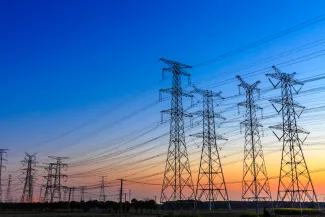
Expert: Foreign cyber threats targeting utilities compromise national security
Click play to listen to this article.
A former White House cyber-security expert is warning of potential cyber attacks on critical infrastructure.
Former Principal Deputy National Cyber Director Jake Braun was in Arizona recently to talk about the threat.
He's now the Executive Director of the Harris School of Public Policy Cyber Policy Initiative at the University of Chicago.
He said during his time at the Biden White House, he dealt with escalating cyber threats from China and other nation-states targeting water and energy utilities.

© zhaojiankang - iStock-802436842
"They are very deliberately targeting specific water utilities, specific energy operators and so on - that are civilian but support military installations," said Braun, "so that if we go to war, they've kind of seeded the battlefield so to speak with malware."
Braun said nationwide there are about 50,000 water utilities, but only a few hundred support military operations.
He added that while the federal government is focused on safeguarding those, the majority fall through the cracks.
Braun said he's working with the National Rural Water Association to recruit cyber-volunteers that'll provide free cybersecurity support to local water utilities.
Braun said cybercriminals could hack utilities because they want a ransom. He said those cases are increasing, and start primarily in Russia and other Eastern European countries.
But he added that countries like China are wanting to infiltrate and weaken critical infrastructure.
While Braun was sounding the alarm, he was also advocating for solutions. He said the Bipartisan Infrastructure Law provides billions of dollars to revamp water infrastructure.
"And many water utilities aren't even requesting the funds," said Braun. "So the funds are there, they're available and water utilities often don't even know they can request the funds for that. And that is true for many other critical infrastructure."
Braun said he understands that money isn't enough. He added that some water utilities are in such remote, rural areas, they'll struggle to find cyber security experts.
But he said that's where the cyber volunteer program, Project Franklin, comes in.
"Volunteer programs like this one," said Braun, "are going to be really what's available to them for the foreseeable future."
















